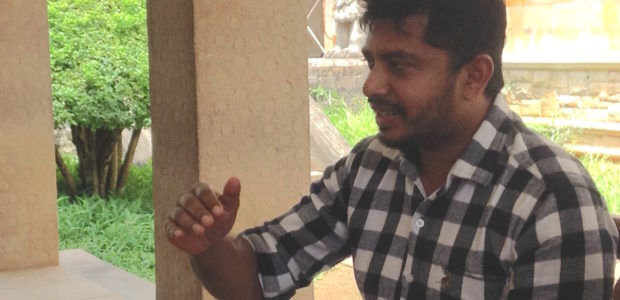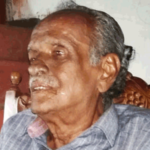Political Culture?
The National List Opportunity Should be for an Educationist!
“I believe there is no conflict among ethnicities in Sri Lanka” saud Thushara Kamalaratne, Lecturer in Sociology at the University of Peradeniya
“I believe there is no conflict among ethnicities in Sri Lanka. If that were the case, then today a person would not talk face to face with another; they would turn their faces back at each other. But we have no understanding among us”, Thushara Kamalaratne, Lecturer in Sociology at the University of Peradeniya, told The Catamaran. “The political culture of the country must be transformed and a leader who is free of political, racial and religious bindings and political pressures must govern the country”.
THE CATAMARAN: What is your observation of the political, social and economic situation of the country at present?
The current regime goes beyond their limitations. That is, the law and order situation is pathetic. It is like starting a vehicle and sending it on the road without a driver; no doubt it will cause accidents. The current state of the country is similar to that. It just moves without any guidance. Politicians and executives are acting beyond their means. There are regulations but not implemented properly.
The economy has fallen into the abyss. There is no money to pay the salaries of state employees. I understand that Central Bank Bonds are being sold to the private sector to pay the salaries of state sector employees.
As far as society is concerned, there are protest demonstrations everywhere in the country and the government is unable to control these; it is quite clear. They should either give what the people ask for or say it is impossible. But they don’t do that because it is not capable of doing that.
On the other hand, people’s confidence in the judiciary has been lost. This is because politicians give the verdict before a court ruling. We sometimes witness two punishments for the same crime. Thus people have lost confidence in social, economic, law and order systems.
THE CATAMARAN: Together with such situation ethnic and religious conflicts are also occurring in this country.
I believe there is no conflict among the ethnicities in Sri Lanka. If that were the case, then today a person would not talk face to face with another; they would turn their faces back at each other. But we have no understanding among us. The politicians are capitalizing on this and making it into a conflict.
We travel together by bus; is anyone chasing us? We walk together on the road without any problem. When I go to Jaffna people there take good care of me. Students of all ethnicities are studying and living together for about four years at this university. Where, then, is the conflict between these ethnicities? It is planned and imposed on us. And so we look at each other with suspicion. This is entirely within their political agenda.
This is not a new phenomenon. This divisive trick was used by the British to divide and rule. This policy was easier for them to carry on with the regime. They divided the masses into classes. That pattern continues even today.
THE CATAMARAN: How can we overcome this divisive mentality imposed on us?
A Sri Lankan national leader must emerge. Such leadership was found in India. All ethnic, religious and linguistic people were absorbed into it. But none of the parties formed after 1948 in Sri Lanka was nationalistic. Instead they formed parties that represented only their class people. They depend on these group of people. Therefore, a national leader must be created.
Civil society got strengthened under good government. We thought it would continue to work with that strength. But it did not. There is still the possibility of creating civil society without the pressure of political, racial or religious differences. It has to be done.
Therefore, a person who is not aligned to any political party should be elected as the leader and such person should be given the authority. Such a leader will not have a political ideology or pressure of a political party. That leader is seen as a person who understands the mindset of the people. If the ruler is not right, people will replace that leadership. Such a system should be established in our country.
THE CATAMARAN: This year’s presidential election has the highest number of candidates (35). This includes many unknowns in the public sphere. To what extent is it healthy for politics?
Candidates suddenly announce the will run for the election. The political culture of our country is so weak. A candidate comes in a month after the election is announced. Then another comes. Is this short period enough to determine the country’s president? People don’t know about Mahesh Senanayake, for example. He is also competing.
Look at the US election system. Candidates have been announcing their policies to the media for months. It is broadcast daily by all the media. Then the people will come to know who the candidates are, what their benefit to the country is and what their policies are. This situation must occur in our country. How would people know about him/her if that person is announced a presidential candidate just a month before the election? This political culture needs to change.
THE CATAMARAN: This political culture does not absorb educated people. Such people don’t even contest. How to handle this situation?
The ‘national list’ concept is seen as a mechanism for the inclusion of academics who cannot contest and come to parliament but ones who should be in parliament. But what happens is those henchmen who were rejected by the people are selected through the national list. It is a violation of the right of the people to bring back a person whom they have rejected. The National List can therefore be reserved for educated think-tanks.
THE CATAMARAN: You say you can find better diversity and fellowship within universities. Even those students when they are out in society, we don’t see ethnic and religious issues minimizing.
We guide students in the best way. We help them identify the problems and find ways to solution. Because of that student from the three ethnic communities are united when they are in the university. But after leaving, the separatism that originates from somewhere is deliberately infused into their minds. This is why we say we have to build a better civil society. It is only by acting on many fronts well-intentioned students will prevented from falling into the trap of communal politics.
Next, the media, which is an important part of the community, is also biased in many cases. This situation needs to be changed and a media culture should be free from any interference.










